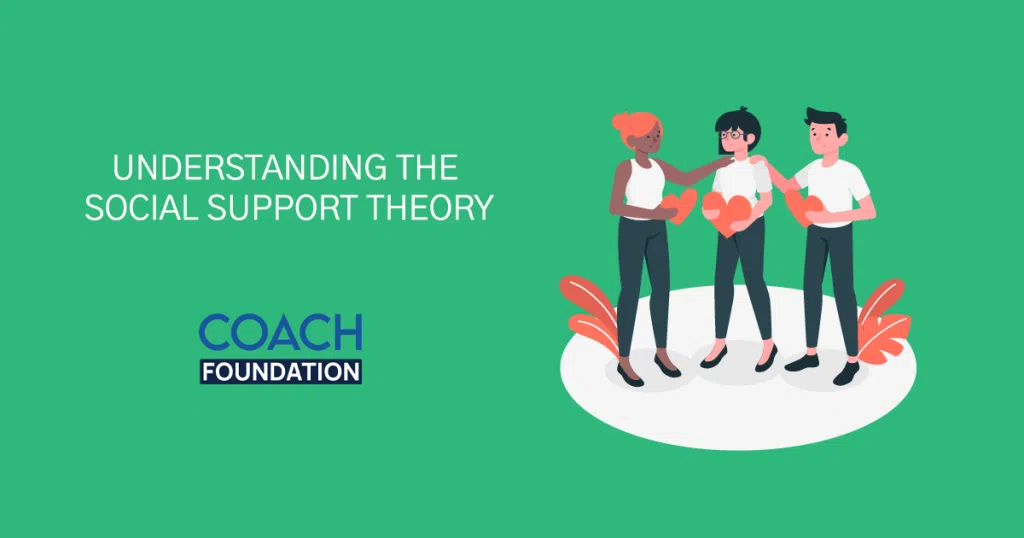Understanding The Social Support Theory
Social support theory is a framework that explores how social connections and relationships can provide individuals with emotional, informational, and practical assistance during times of stress or challenge. This theory posits that social support can have a significant impact on an individual’s well-being, coping strategies, and overall health outcomes.

Social support can come from a variety of sources, including family, friends, coworkers, and community organizations. By understanding the importance of social support in individuals’ lives, we can better identify ways to provide meaningful support to those who may be experiencing difficult times.
In this blog, we’ll explore:
1. What is the social support theory
2. How does social support theory work
3. Core Concepts of social support theory
4. Application of social support theory to life coaching
So, let’s get started!
What is the Social support theory
The social support theory is a psychological framework that emphasizes the importance of social connections and relationships for individuals’ well-being, particularly during times of stress or challenge.
According to this theory, social support can take many forms, including emotional support (e.g., providing comfort, encouragement, or empathy), informational support (e.g., providing advice or guidance), and instrumental support (e.g., providing practical assistance or resources).
Research has shown that social support can have a significant impact on individuals’ physical and mental health outcomes. For example, individuals who have strong social support networks are less likely to experience depression, anxiety, and other mental health issues. Social support can also improve individuals’ ability to cope with stressors and recover from illness or injury.
Social support can come from a variety of sources, including family members, friends, coworkers, and community organizations. The type and amount of social support an individual receives can vary depending on factors such as their personality, culture, and social environment.
By understanding the social support theory, individuals can identify ways to provide meaningful support to those who may be experiencing difficult times. This may involve offering emotional or practical assistance, connecting individuals with community resources, or simply being present and available to listen and offer support.
Check out this video to learn more about Social Support!
How the social support theory works
The social support theory suggests that social connections and relationships are essential for individuals’ well-being, particularly during times of stress or challenge. Social support can take various forms, including emotional, informational, and instrumental support. Emotional support includes providing comfort, empathy, and encouragement to individuals in need.
Informational support involves providing advice, guidance, or knowledge to help individuals navigate challenging situations. Instrumental support includes providing tangible resources or practical assistance to individuals in need.
For example, consider a person who has recently been diagnosed with a chronic illness such as diabetes. This person may experience stress, anxiety, and uncertainty about how to manage their condition. Social support can help alleviate some of these negative emotions and provide practical assistance.
Emotional support can come from family members, friends, or a support group that offer comfort, empathy, and encouragement. Informational support can come from healthcare professionals or online communities that provide knowledge and guidance on how to manage the condition. Instrumental support can come from friends or family members who help the person with tasks such as grocery shopping or transportation to medical appointments.
By providing social support, individuals can improve their well-being, increase their resilience, and better manage challenging situations. The social support theory suggests that by fostering strong social connections and relationships, individuals can improve their overall health outcomes and enhance their ability to cope with stress and adversity.
I went through this intriguing article explaining the workings of social support theory and would suggest the readers go through it once!
Core concepts of social support theory
The core concepts of social support theory are the importance of social connections and relationships for individuals’ well-being, the different forms of social support (emotional, informational, tangible, and companionship), and the impact of social support on individuals’ physical and mental health outcomes. The theory emphasizes that social support can come from a variety of sources and that its effectiveness can vary depending on an individual’s personality, culture, and social environment.
Types of social support
There are various types of social support, including emotional, tangible, informational, and companionship support.
Emotional support involves providing comfort, empathy, and reassurance to individuals during times of stress or difficulty. Close friends or family members are typically the ones who provide this kind of support, which can aid people in controlling their emotions and coping with difficult circumstances.
Tangible support involves providing practical assistance or resources to individuals in need. This may include offering financial assistance, helping with household chores, or providing transportation to medical appointments.
Informational support involves providing advice, guidance, or knowledge to help individuals navigate challenging situations. This type of support can come from a variety of sources, including healthcare professionals, community organizations, or online resources.
Companionship support involves providing social interaction and a sense of belonging to individuals. This can involve spending time with others, participating in social activities, or joining support groups.
Learn about the types of social support in this article!
Sources of social support
There are various sources of social support that individuals can turn to during times of need, including family, friends, the community, and institutional sources.
Family members: Including parents, siblings, and extended family, often serve as primary sources of social support for individuals. Friends, including close friends and acquaintances, can also provide emotional and practical support.
Community-based sources: These may include religious or spiritual organizations, volunteer groups, or local community centers. These sources can provide companionship, informational support, and access to resources.
Institutional sources: These may include healthcare providers, mental health professionals, and government agencies. These sources can provide individuals with access to medical care, financial assistance, and other essential services.
Check out this video to learn more about sources and the importance of social support.
Mechanisms of social support
There are various mechanisms by which social support can impact individuals’ well-being, including buffering, direct effects, and stress contagion.
Buffering: It refers to the protective effect of social support in reducing the negative impact of stressors on individuals. For example, individuals with strong social support networks may experience less stress and better physical and mental health outcomes in response to challenging situations.
Direct effects: It refers to the positive impact of social support on individuals’ well-being, even in the absence of stressors. This may include improved emotional regulation, increased self-esteem, and greater life satisfaction.
Stress contagion: It refers to the negative impact of social support on individuals, particularly in cases where the support provider is also experiencing stress. For example, individuals may experience increased stress and negative emotions when they provide social support to others who are also experiencing stress.
A detailed overview of the social support theory and its importance for young adults’ mental health can be found in this video!
Applying Social Learning Theory to life coaching
Social support theory can be applied to life coaching to help clients improve their well-being, enhance their coping skills, and navigate challenging situations. Life coaches can provide various forms of social support, including emotional, informational, and instrumental support.
Emotional support can involve providing clients with empathy, validation, and encouragement to help them manage their emotions and build resilience. For example, a life coach may offer emotional support to a client who is struggling with a difficult life transition, such as a job loss or a divorce.
Informational support can involve providing clients with knowledge, guidance, and resources to help them navigate complex decisions or situations. For example, a life coach may offer informational support to a client who is considering a career change, providing advice and resources to help them make informed decisions.
Instrumental support can involve providing practical assistance or resources to help clients achieve their goals. For example, a life coach may offer instrumental support to a client who is trying to adopt healthier habits, such as providing guidance on nutrition and exercise or connecting them with a personal trainer.
By providing social support in various forms, life coaches can help clients improve their overall well-being and achieve their goals. Social support theory can help life coaches understand the importance of social connections and relationships in promoting positive outcomes and guide their approach to coaching clients.
Conclusion
In conclusion, social support theory highlights the importance of social connections and relationships in promoting individuals’ physical and mental health outcomes. The theory recognizes the different forms of social support, including emotional, informational, instrumental, and companionship support, and emphasizes the importance of identifying suitable sources of support.
By understanding the mechanisms of social support, individuals can maximize the positive effects of social support while minimizing the potential negative effects. Social support theory has broad applications in various fields, including healthcare, psychology, and coaching.
I appreciate and value your feedback and input on this topic. Your insights can contribute to a deeper understanding of the subject matter and facilitate a more engaging and thought-provoking discussion. I look forward to reading your thoughts in the comment section.
Frequently Asked Questions (FAQs)
What is the concept of social support theory?
Social support theory is the idea that individuals’ social connections and relationships impact their physical and mental health outcomes. It recognizes the different types of social support, including emotional, informational, instrumental, and companionship support, and highlights the importance of identifying suitable sources of support.
What are a few examples of social support theory?
Some examples of social support theory include:
1. A group therapy session for individuals struggling with addiction, where participants offer each other emotional support and share their experiences.
2. A new mother receives informational support from her own mother or a parenting class to learn how to care for her baby.
3. A cancer patient receives instrumental support from friends and family members who offer transportation to appointments and help with daily tasks.
4. A student receives companionship support from a mentor who offers guidance and encouragement throughout their academic journey.
Who founded the social support theory?
The social support theory does not have a single founder. It has evolved over time through the contributions of various researchers, including Cobb, Cassel, and House, who recognized the importance of social connections in promoting individuals’ well-being.

ABOUT SAI BLACKBYRN
I’m Sai Blackbyrn, better known as “The Coach’s Mentor.” I help Coaches like you establish their business online. My system is simple: close more clients at higher fees. You can take advantage of technology, and use it as a catalyst to grow your coaching business in a matter of weeks; not months, not years. It’s easier than you think.
AS SEEN ON






